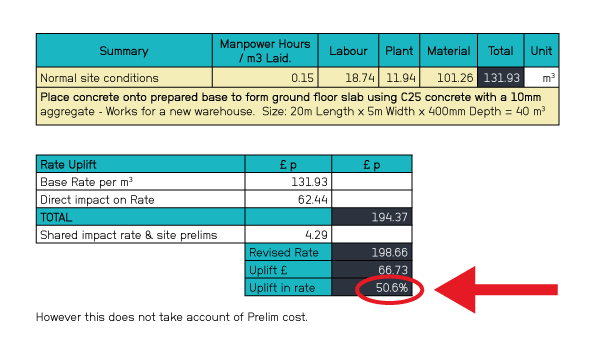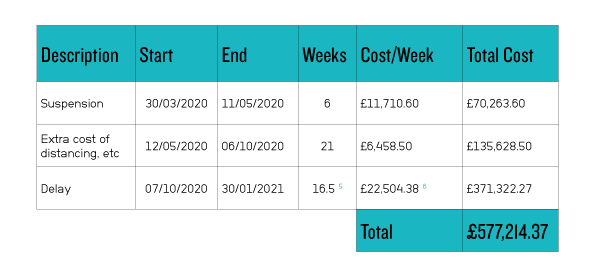

olympus-google-fonts domain was triggered too early. This is usually an indicator for some code in the plugin or theme running too early. Translations should be loaded at the init action or later. Please see Debugging in WordPress for more information. (This message was added in version 6.7.0.) in /home/ploi/aquia-forensics-new.stagingds.co.uk/public/wp-includes/functions.php on line 6114twentytwentyone domain was triggered too early. This is usually an indicator for some code in the plugin or theme running too early. Translations should be loaded at the init action or later. Please see Debugging in WordPress for more information. (This message was added in version 6.7.0.) in /home/ploi/aquia-forensics-new.stagingds.co.uk/public/wp-includes/functions.php on line 6114

Much has been written around liability and interpretation of clauses for construction firms and employers alike, as a result of the immediate fallout from the COVID-19. However, the financial losses and cost implications arising from this pandemic are yet to be fully understood, at either project or company level.
In these uncertain times, where contractual notices are being issued with ever increasing frequency across construction projects, and as employers, contractors and sub-contractors attempt to understand their contractual obligations, it is important for the parties concerned to comprehensively understand the actions they are taking now and the financial consequences of those actions in the not too distant future.
The debate over liability, that is whether and to what extent each party should be held liable, is the subject of discussion and articles from all members of the construction industry. This debate includes whether there should be an entitlement to time only, or time plus money and more recently the extent to which the pandemic will have an impact on contractual relationships, both up the chain as well as down. Collectively and separately, these are issues that are going to require much dissection over the coming months, yet whilst the cause of disruption to usual working practices is evident, the attribution of liability and quantification of the impact are yet to be fully explored and understood. In particular, the loss element of the breach-causation-loss sequence will require deeper investigation, as contractors have yet to understand the repercussions that may be felt for months after the lockdown has ended. So, as the position of how claims will be settled remains uncertain for the time being, the cost implications of this pandemic will still need to be established.
Different contracts will produce different outcomes, due to the clauses inserted and agreed upon by both parties (or not as the case may be). The current climate may mean eroding previously hard-won profit share arrangements under NEC contracts and the situation for recovery provisions profit via share (if indeed there would be any due) for costs under JCT contracts could also be left in doubt. In terms of potential solutions, relying on parties being more understanding and/or compassionate in times when businesses will be under ever increasing cash-flow pressures, is rather optimistic.
If a compassionate approach may be adopted by some businesses in anticipation of better times ahead and/or in order to maintain a good working relationship, it is hard to predict if this will be the most appropriate course of action for the longevity of the business. These times will put pressure on balance sheets and business relationships, as whilst it may be easy to maintain healthy business partnerships in the good times, it is in the difficult times that these relationships will truly be tested.
April 2020 saw a necessitated productivity standstill on many construction sites. The consequences of this and the corresponding significant decline in productivity, is unlikely to be felt until some months later. The cash-flow dependency of our industry will mean that the impact will be more severe for those caught in the middle, typically impacting those toward the bottom of the supply or contractual chain.
At a site-level, contractors will be directly affected as productivity levels plummet and workforce attendance suffers. There are already many examples of sites being partially closed where sub-contractors are implementing furloughing schemes, whilst main contractors are keeping sites open, expecting progress to continue 1. It takes a brave contractor or client to carry the financial burden in these challenging times, especially in the face of a contract that may not enable future recovery of losses. Liability for liquidated damages will ultimately be attributed to the parties as per the relevant contractual terms but the costs of additional health and safety measures will likely rest with the contractor, as will reduced levels of productivity, particularly with JCT and FIDIC contracts.
To that end, and to illustrate the impact that such an event can have upon site productivity levels, and ultimately costs, a hypothetical example of the type of internal productivity calculations that may be faced by a contractor, is provided in Appendix 1. In it, the additional measures that may be required on sites, such as social distancing, reduced supply chain, staggering deliveries, etc., are highlighted. The example focusses on providing a concrete slab for a warehouse and illustrates how the cost of m3 rate for the concrete pour, could increase by approximately 50%.


The figures in the above table take into account the following:
These elements could have a dramatic impact on costs, so much so that the direct cost (i.e. the rate itself) would potentially increase from £132/m3 to £199/m3
but this is only part of the story. The above does not take into account time-related indirect costs.
One option may be for the suspension of works, which could include mobilisation and demobilisation costs. A temporary suspension or site closure of six weeks would still incur site costs (estimated in our example at £12k/week) 3. Whether this option is even considered, it would have to be balanced against the elasticity the business would have in terms of its short term and long-term potential cash flow.
Then without acceleration measures, the original impact of the delay would potentially result in a further time-related impact cost of approximately £16k a week4:


However, now with distancing measures etc., the additional cost required would increase in any event.


Given the current circumstances it would not be entirely unexpected that a site may lockdown/close for six weeks and then operate for the rest of the project under the social distancing guidelines. Using a hypothetical contract completion date of 6 October 2020, this would potentially mean a revised completion of 31 January 2021, incorporating the reduced productivity and suspension, as follows:


The above deliberately simplistic and hypothetical example gives an illustration of how a project can be disrupted and the consequential cost impact this can have. Further theories and articles are available demonstrating the power of this kind of ripple effect. Although this example deals with only one activity, this ripple effect will apply to a number of different activities, across the entire site. Thus, the inter-relationship between site activities and additional factors leading to a further reduction in productivity levels, will need an omniscient overview.
Negotiation, compromise and, hopefully, agreement between the parties will be a key way forward. There will of course be hope that where compromise is possible, it would encourage fairness in future proceedings. However, with parties facing potential site and/or business closures and livelihoods being detrimentally affected, it is anticipated that disputes will nevertheless arise.
Naturally, each site will have its own individual issues and the problems that come with it will vary from one site to the next. It is all the more important then, for the purposes of protection against future claims, that contemporaneous and accurate records, particularly for costs, are kept. If the records are as accurate as they possibly can be, then the assessment of costs and losses will likely be reflective of the actual scenario being faced by the site. For further articles by Aquila Forensics on the benefits and best practice of record keeping, please contact: enquiries@aquilaforensics.com.
For future growth and recovery, businesses will have to take steps which they may be reluctant to or feel rather uneasy in doing so. Thus, recognising the difference between respective cost and value positions and understanding cash-flow will be crucial. Undertaking an analysis of productivity and changes in earned value, will help to gain a perspective in any negotiations, irrespective of where liability may lie.
A thorough comprehension of financial positions (and not just the liability or contractual ramifications) for all parties may pave the way for a stronger, more collective industry in a post-coronavirus world. That said, these are emotional times, so there needs to be a greater awareness that some decisions may be more emotionally fuelled than usual. Maintaining short-term positions may allow temporary respite, but ultimately, consideration of the continuing risks is likely to be beneficial for a longer-term future, providing the immediate dangers can be successfully navigated. Even actions such as up-front payments to smaller suppliers, shorter payment terms, restructuring material deliveries, etc., may make considerable differences in the end.
This pandemic may have enforced changes in working practices not previously envisioned, but perchance it may encourage the industry to use it as a time of reflection too. By focussing on the intention behind the contract (particularly as it would most likely have been agreed in a pre-pandemic world), this may ensure that partnership, good faith and trust, reign over the literal interpretation and strict application of the wording. For that to happen though, compromise by all those with privity to the contract, will be required.
Aquila Forensics are experts in the quantification and assessment of construction costs and our knowledge can be applied to these unprecedented circumstances in order to assist you better in understanding your commercial position. Our team has extensive experience in dealing with mega-projects and domestic claims particularly in the oil and gas, energy, infrastructure, marine and aviation sectors.